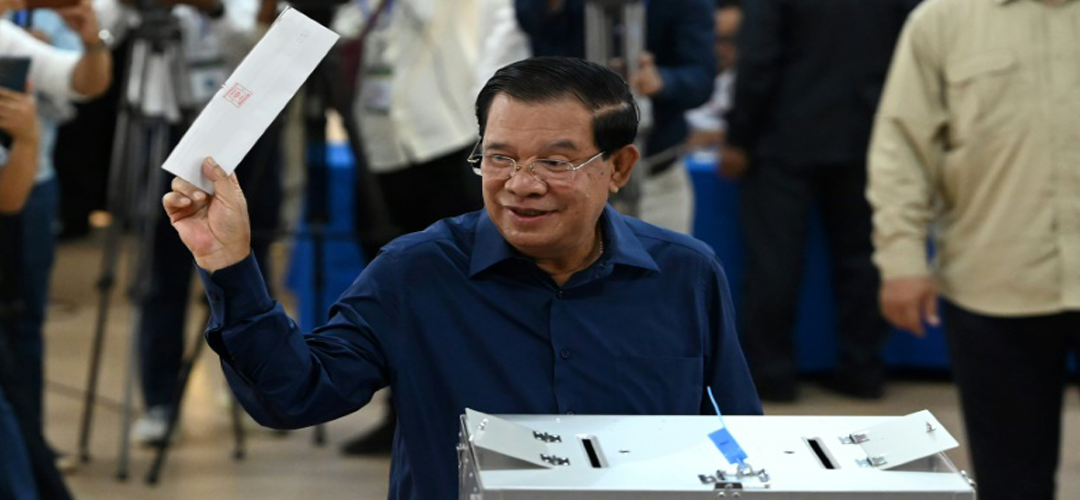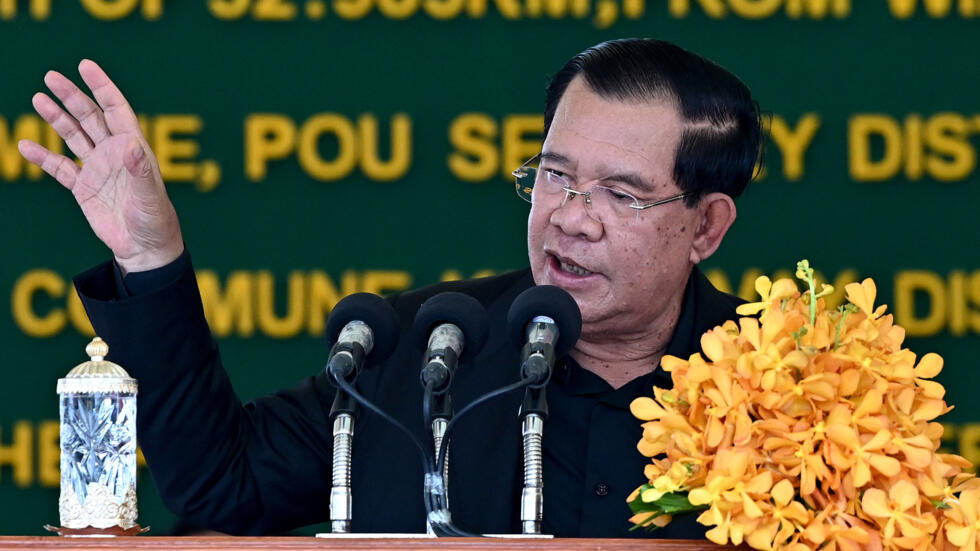Democracy Cambodian Style
August 5, 2023 | Expert Insights

Cambodia, the infamous killing fields of the brutal Khmer Rouge, finds little mention in global media these days. This is good news because the country has, over the years, adopted democratic norms and has been successfully conducting democratic power transitions through elections. However, the concern is whether the power elites remain the erstwhile communist cadre that brought such bloodshed to this beautiful country, now in a democratic avatar.
In a recent election, the ruling Cambodian People's Party (CPP), led by Prime Minister Hun Sen, won a landslide victory in Cambodia's general elections. The election has been criticised as a sham, given that the ruling party faced no viable opposition after almost any considerable opposition was eliminated through a ruthless crackdown. The contest featured the CPP and 17 mostly obscure parties, out of which none had won any seats in the last general election in 2018.
As Cambodia’s autocratic leader of 38 years, Hun Sen prepares to hand over the reins to his son Hun Manet, major regional powers are watching – most notably China and Japan. While Hun Sen's government has heavily relied on China for economic assistance, Japan is also interested in gaining a stronger foothold in Cambodia.
Background
Cambodia was once the powerful kingdom of Angkor, the centre of the Khmer Empire, which lasted from 802 to 1431 CE. At its peak, it covered most of what is today Cambodia, Thailand, Laos, and South Vietnam. The empire gradually shrank and declined until Cambodia became a small Buddhist kingdom, dependent on its neighbours' goodwill. In 1863, the King of Cambodia, concerned about Thailand's intentions, requested France to lend protection to the kingdom. Cambodia became a French protectorate and came under French colonial rule until it attained independence from France in 1953.
In the late 1960s, it was drawn into the Vietnam War and the conflict between the U.S. and communist forces. In 1975, the Communist Khmer Rouge forces overthrew the pro-US government. Under the brutal Khmer Rouge rule, about 1.5 million Cambodians died from overwork, malnutrition, and executions. A Vietnamese invasion ended the totalitarian rule headed by military ruler Pol Pot in 1979.
A few words about Prime Minister Hun Sen, a former Khmer Rouge cadre who, at the peak of the genocide when the party was purging its own leaders, sought sanctuary in Vietnam. He returned in 1978 as the Cambodian face of the Vietnamese invasion. He took on the post of foreign minister in 1985 before taking over as the prime minister under the UN Transitional Authority (UNTAC) in 1993. In 1997 he consolidated his position in a military coup, and since then, he has won every subsequent election.
Analysis
Hun Sen could be amongst the world’s longest-serving prime ministers. He has kept himself in office by eliminating opposition party leaders or having the party disqualified by the courts. In the 2013 elections, the main opposition, the Cambodian National Rescue Party (CNRP), fell short of a win because of irregularities. During the 2018 elections, the CNRP was dissolved by Cambodia’s top court, which is politically controlled. Leading up to this year’s elections, the Candlelight Party was banned, being the main opposition. Further, Hun Sen’s increasingly authoritarian regime has also suppressed independent media and civil society groups. Clearly, Hun Sen does not believe in a ‘level playing ground’ when it comes to elections!
As age catches up to him, the ground has been prepared for a smooth dynastic transition to his son Hun Manet. However, the veteran guerilla is unlikely to fully relinquish power as long as he is alive and may wield power behind the scenes. There is a genuine concern that the long-simmering public discontent could erupt in the streets during this transitional period.
Major world powers like the U.S. have condemned the elections as neither free nor fair. However, sanctions and condemnation have little effect on the regime, given that China continues to back it with massive economic aid and diplomatic support.
China continues to be Cambodia's largest foreign investor. A month before the elections, Hun Sen announced another infrastructure project (another expressway) funded by China. The expressways could form a part of the larger network of China's Belt and Road Initiative. China's economic support offers legitimacy to the regime in the eyes of the general public, making Hun Sen highly reliant on China to deliver signs of economic progress. However, the growing role of Chinese finance in Cambodia's development has led to concerns that Cambodia has taken on impossibly high debt, making it beholden to Beijing. For China, Hun Sen's victory and his unshakeable hold over the Cambodian government is welcome, given his close relations with China. While Western powers like the U.S. have qualms about Hun Sen's disdain for democracy, Chinese support comes without any requirements of adhering to human rights or democratic practices.
Japan, another regional heavyweight, is also concerned about China's growing influence across Southeast Asia. Tokyo is keen to counter the rapidly growing Chinese investment and political clout in Cambodia. It is looking to increase its presence in the country through grants, loans, trade, investment, and diplomatic relations. Between upholding democratic principles and maintaining economic power in Cambodia, Japan may favour the latter, even if it means backing an authoritarian regime.
Hun Sen is also known to be on good terms with Vietnam, having come to power in the 1980s with Vietnamese support. Due to the troubled history between the two countries and longstanding border disputes, relations with neighbouring Vietnam are a contentious issue in Cambodia. The CPP's lenient approach towards illegal Vietnamese immigrants in Cambodia has also been a source of controversy. If Hun Manet becomes prime minister and follows his father's footsteps, Cambodia and Vietnam are likely to remain on good terms. On the other hand, the CPP may choose to distance itself from Vietnam as a part of a new strategy to garner more popular support.

The Indian Angle
India and Cambodia ties can be traced as far back as the 12th Century when the famous Angkor Wat was constructed (All of the original religious motifs are derived from Hinduism, with the temple dedicated to the gods Shiva, Brahma, and Vishnu).
Along with the late King Norodom Sihanouk and Jawaharlal Nehru, both nations were architects of the NAM. When the genocidal Pol Pot regime was in power between 1975 and 1981, India was its bitter critic. After its fall, India became the first country to recognise Kampuchea under Heng Samrin. When the UNTAC was established in 1987, India was the leading contributor of UN peacekeepers and military deminers.
Under India's "Act East Policy, India is again looking at friends in South East Asia to balance the Chinese influence. Cambodia would be very high on the list of countries where India must deepen its economic and cultural relations.
Assessment
- The CPP's landslide victory in Cambodia evidences the stronghold that Hun Sen has with virtually no opposition. Obviously, over the years, any traces of alternate power centres in the country have been wiped out. This does not bode well for the country's democratic future.
- As Hun Manet is set to become the new prime minister, it remains to be seen how the change in leadership will play out. However, Hun Sen is only 70 years old and has decades ahead to play the role of the real power behind the throne!
- China continues to welcome Hun Sen's pro-China regime, while Japan is keen on countering China's influence in Cambodia. The CPP may choose to continue its pro-Vietnam policy or change policy to revamp its image. As regards India, Cambodia and Vietnam are ideal places to further its "Act East" policy.








Comments